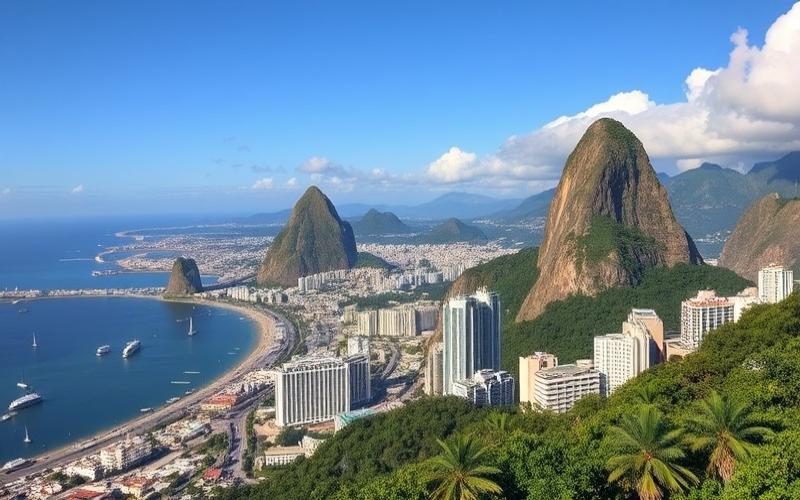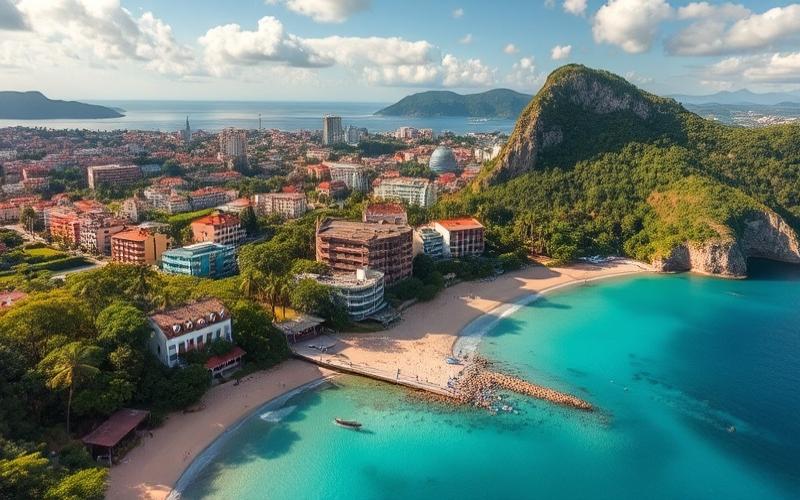
 Published on and written by Cyril Jarnias
Published on and written by Cyril Jarnias
The Brazilian real estate market is attracting more and more international investors eager to take advantage of the numerous tax benefits offered by the country’s government to stimulate the economy. Indeed, Brazil implements tax incentives such as the exemption from real estate gains tax for certain transactions, making this investment particularly attractive.
However, it should be noted that this opportunity comes with strict restrictions, such as regulatory constraints around land rights and registration requirements that require a thorough understanding of the local legal framework.
In this context, this article aims to explore the opportunities and challenges associated with real estate investment in Brazil, offering valuable insight for anyone considering venturing into this dynamic market.
Introduction to Real Estate Investment in Brazil
The Brazilian real estate market holds a central place in the national economy, driven by growing dynamism and continuous price appreciation. In July 2025, the housing index reached 176.1 points, representing an increase of over 75% since 2012. The residential market size is estimated at $59.61 billion USD in 2024, with a projected compound annual growth rate (CAGR) of approximately 5.4% until 2029. The commercial sector also shows robust prospects: it is expected to reach $63.67 billion USD in 2024 and grow at a CAGR of 8.7%, supported by logistics and industrial expansion.
Main Cities and Attractive Regions for Foreign Investors
- São Paulo: major financial center with strong rental demand.
- Rio de Janeiro: tourist appeal and luxury market.
- Belo Horizonte: industrial dynamism.
- Maceió & Fortaleza: high yields on the northeastern coast for seasonal or annual rentals.
- Minas Gerais (Southeast): logistics and industrial development.
Key Elements to Consider When Investing in Brazilian Real Estate
- Current economic climate marked by resilience despite monetary fluctuations; the depreciation of the Brazilian real stimulates foreign investment.
- Fluctuating but historically attractive mortgage interest rates for non-residents with significant down payments.
- Favorable rental trends in major metropolitan areas; gross yield generally between 4% and 8%, potentially reaching 10% in certain tourist or university neighborhoods.
Available Investment Options
| Asset Type | Main Characteristics | Concrete Example |
|---|---|---|
| Residential | Urban apartments/furnished studios | Studios near subway/universities |
| Commercial/logistics | Offices, industrial/logistics spaces | Warehouses in South/Southeast |
| Land | Land purchase for future development | Expanding peripheral zones |
Concrete Examples & Recent Statistics
- In Maceió:
- Long-term studio ≈€320/month
- Two-bedroom apartment ≈€650/month
- In the micro-apartment segment:
- Investment near university hubs = high occupancy rate + net yield above local average
Revealing Case Studies
“By combining annual and short-term rentals according to seasonality in São Paulo/Belo Horizonte, we secured a high occupancy rate.”
“In Maceió, the complementarity between annual/seasonal rentals optimizes the yield on studios located in coastal neighborhoods.”
Opportunities
- Continuous growth driven by rapid urbanization
- High potential in the commercial/logistics segment
- Residential market favorable for small units/affordable prices
Challenges
- Currency volatility impacting net profitability
- Sometimes complex regulations depending on geographic areas
- Variable rental vacancy outside major hubs or tourist sectors
In summary: The Brazilian real estate market offers foreign investors a varied palette—from urban residential to logistics land—with attractive yields particularly in dynamic major cities or emerging tourist areas. Opportunities are numerous but must be accompanied by a fine analysis of the local context (economic climate/rates/rents/regulation).
Good to Know:
The Brazilian real estate market, growing with São Paulo at the forefront, offers attractive rental yields but requires vigilance on variable interest rates. Consider purchasing land in emerging regions whose potential is supported by recent urbanization data.
Tax Benefits Related to Buying a House in Brazil
Tax Deductions for Buyers
Property owners in Brazil can benefit from several tax deductions, including:
- Standard 20% deduction on gross rental income (for personal income tax).
- Deduction of maintenance and repair costs, property and housing taxes, property management fees and especially, real estate loan interest.
- For tourist rentals (“flat service”), a reduced fixed rate of 5% of gross revenue is applied.
| Expense Type | Deductible? |
|---|---|
| Real estate loan interest | Yes |
| Maintenance/Repairs | Yes |
| Property/housing taxes | Yes |
| Property management fees | Yes |
Note: Non-residents benefit less broadly from rental deductions (flat rate without deduction or standard allowance).
Minha Casa Minha Vida Program
This national program aims to facilitate homeownership for low-income households through:
- Direct or deferred subsidies
- Reduced mortgage rates
- Partial or total exemption from certain taxes during acquisition for primary residence
Eligible buyers thus enjoy a significant reduction in total cost thanks to these combined aids, making taxation lighter for a first acquisition.
Conditions and Incentives Specific to Foreign Investors
For foreign investors:
- Possibility to invest via a Civil Real Estate Company (SCI), allowing tax flexibility (choice between actual or presumptive regime) and optimization through deductions similar to residents.
- Progressive taxation on capital gains based on the gain amount upon resale.
Possible administrative difficulties: opening a bank account under strict conditions.
Regional Exemptions & Special Economic Zones
Certain regions benefit from:
Partial/total exemptions on property tax for a few years in developing urban areas or under the federal program Zonas Especiais de Interesse Social (ZEIS).
Example: In some Amazonian states or disadvantaged areas of the Northeast, temporary exemption possible to stimulate residential investment.
Incentive Policies in Strategic Sectors
Local policies encourage real estate purchases in rural/sparsely populated areas through:
- Temporary reduction or even total elimination of transfer taxes
- Targeted tax relief if purchase aims to boost local demography/economic activity
Regional Tax Laws – Diversity by Federated State
Each State can apply its own rules regarding:
| Tax | Possible Variation by State |
|---|---|
| ITBI (transfer tax) | From 2% to 4% |
| IPTU (annual property tax) | Progressive rate based on value/usage |
Some cities also occasionally grant targeted discounts.
Recent Changes in Brazilian Real Estate Tax Legislation
In 2023–2024, several reforms impacted the real estate sector:
- Adjustments in the SCI regime to limit certain abuses; capping of new deductions
- Modification of the real estate capital gains tax scale with progressive rates up to 22.5%
Parliamentary discussions also aim for greater harmonization between states regarding ITBI/IPTU.
Concrete Examples / Case Studies
1. Foreign investor acquiring a tourist apartment via SCI:
– Benefits from standard allowance + optimal tax regime choice → improved net profitability after taxes.
2. Brazilian family purchasing their first primary residence under Minha Casa Minha Vida:
– Subsidy + partial tax exemption = substantial savings (~10–15% total price).
3. Tax resident reinvesting sale proceeds from housing within legal deadline:
– Fully exempt from tax on realized capital gain, if strict criteria related to rapid reuse of funds in new residential purchase are met.
Good to Know:
Homebuyers in Brazil can benefit from mortgage interest deductions and tax refunds, notably through the Minha Casa Minha Vida program which offers tax benefits for primary residences. For foreign investors, tax exemptions are available in certain special economic zones, and tax incentives encourage purchases in low-density areas, although tax laws vary by state.
Restrictions and Regulations for Investing in Agricultural Land
Legislation Governing Land Ownership by Foreigners in Brazil:
Brazil allows the acquisition of real estate by foreigners, but imposes strict restrictions on the purchase of rural land and in certain strategic areas, notably border regions and areas deemed sensitive for national security.
Main Laws and Restrictions:
- Law No. 5,709/1971 and Law No. 8,629/1993:
- Limitation of access for foreign individuals, foreign entities, and Brazilian companies under foreign control to rural property.
- Acquisition or lease of rural land by foreigners limited to 25% of the total surface area of each municipality, with a ceiling of 40% of this quota for nationals of the same country.
- For areas exceeding certain thresholds (50 to 100 fiscal modules), authorization from the National Congress is required.
- Any non-compliant transaction is void, with criminal penalties for involved notaries.
Border and Strategic Areas:
- Purchase or lease of land located within 150 km of the Brazilian border subject to prior authorization from the National Defense Council.
- Strengthened restrictions in areas of interest for national security or the environment.
Role of INCRA:
The National Institute for Colonization and Agrarian Reform (INCRA) must approve most rural land purchase operations by foreigners.
INCRA oversees quota compliance, transaction conformity, and mandatory declaration to land registries.
Lack of authorization or declaration can lead to sale cancellation and penalties for stakeholders.
Table of Main Restrictions:
| Land Type | Main Restrictions | Authorization Required |
|---|---|---|
| Urban areas | Free purchase by foreigners | No, except local exceptions |
| Rural land | Area limits, municipal quotas, nationality | Yes, INCRA, sometimes Congress |
| Border areas | Purchase subject to National Defense Council authorization | Yes |
| Areas > 50/100 MF | National Congress authorization | Yes |
Debates and Recent Legislative Developments:
A national debate aims to ease restrictions on Brazilian companies with foreign capital, notably through bill No. 2,963/2019, currently under discussion in Congress.
Several ongoing court decisions could change the interpretation of rules for companies with foreign participation.
Pressures for reform come from economic actors wishing to facilitate foreign investment in agribusiness, but the issue of national sovereignty remains central.
Permits and Procedures for Purchasing Agricultural Land:
- Obtaining a Brazilian tax number (CPF) for individuals or CNPJ for companies.
- Filing an application with INCRA and, if applicable, the National Defense Council.
- Signing the deed before a notary and registration with the competent real estate registry.
- Strict compliance with quotas and conformity verification by authorities.
Main Considerations for Foreign Investors:
- Need to engage local specialized legal advisors.
- Risk of transaction cancellation in case of non-compliance with procedures.
- Monitoring legislative and judicial developments that may modify the investment framework.
- Consideration of regulatory complexity, especially for companies with foreign or mixed capital.
Key Takeaways:
The acquisition of agricultural land by foreigners in Brazil is strictly regulated and requires specific authorizations. Border and strategic areas are particularly protected, and companies with foreign capital are subject to enhanced regulation. The legislative situation is evolving, making legal monitoring essential for any land investment project.
Good to Know:
In Brazil, foreigners must comply with laws established by INCRA, limiting land purchases in border areas and strategic regions, requiring special permits; recent legislative changes aim to modify these restrictions for companies with foreign participation.
Disclaimer: The information provided on this website is for informational purposes only and does not constitute financial, legal, or professional advice. We encourage you to consult qualified experts before making any investment, real estate, or expatriation decisions. Although we strive to maintain up-to-date and accurate information, we do not guarantee the completeness, accuracy, or timeliness of the proposed content. As investment and expatriation involve risks, we disclaim any liability for potential losses or damages arising from the use of this site. Your use of this site confirms your acceptance of these terms and your understanding of the associated risks.


























































